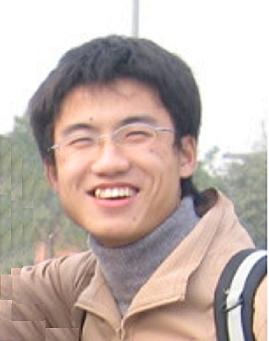Binjie Xu 徐斌杰
From 2008.igem.org
(→Welcome to my personal page 欢迎来到我的主页) |
|||
| (20 intermediate revisions not shown) | |||
| Line 1: | Line 1: | ||
| - | == Welcome to my personal page == | + | == Welcome to my personal page '''欢迎来到我的主页''' == |
| - | [[Image: | + | [[Image:xubinjie2.jpg|right|200px]] |
| + | Hello:) | ||
| + | <br> | ||
| - | + | This is the iGEM08 homepage of Binjie Xu from the University of Science and Technology of China (USTC). Now I am in the fourth year of my undergraduate study. | |
| - | + | Although the ideation process was quite time-consuming and needed even more time to fulfill, I consider it deserved and valuable to go through this. The experience in the iGEM competition helps me to gradually convert from study present to research in future. Therefore, I dedicated myself to the competition and did my best in both thinking out ideas and performing experiments. | |
| - | + | ||
| - | + | As to research, my group in the team (Zhen Xu and me) is focusing on constructing the systems that generate, receive and respond to the signal molecules (3OC6HSL & C4-HSL). In another word, we are trying to build the initiation part in the differentiation system. This part is essential for the whole differentiation process and the gene LuxI in the sequence that generates the synthase for 3OC6HSL marks whether the cell is "sender" or "receiver". | |
| + | |||
| + | Through the research experience in the project, I have the feeling that I am charmed in the field of quorum sensing. The communication among individuals is no longer the patent for higher organisms. Although the genomes of bacteria are relatively small, the regulation system for quorum sensing is fairly complex. For instance, P. aeruginosa can generate at least three types of signal molecules --LasR, RhlR, QscR. The delicate regulation in the species is an amazing field to be discovered. | ||
| + | |||
| + | Feel free to contact me if any question. :) | ||
| + | |||
| + | My email address is: | ||
| + | ::::::xubinjie@mail.ustc.edu.cn | ||
| + | |||
| + | |||
| + | |||
| + | ::::::::::::[https://2008.igem.org/Team:USTC/Team <<Back to the Team]:::::::::::::::::[https://2008.igem.org/Team:USTC Forward to USTC Home Page>>] | ||
| - | |||
| - | + | ---- | |
| + | :'''''"Good ideas in the biological world are not restricted in rare example!"''''' | ||
| + | ::::::::::::::E.P. Greenberg | ||
Latest revision as of 14:11, 29 October 2008
Welcome to my personal page 欢迎来到我的主页
Hello:)
This is the iGEM08 homepage of Binjie Xu from the University of Science and Technology of China (USTC). Now I am in the fourth year of my undergraduate study.
Although the ideation process was quite time-consuming and needed even more time to fulfill, I consider it deserved and valuable to go through this. The experience in the iGEM competition helps me to gradually convert from study present to research in future. Therefore, I dedicated myself to the competition and did my best in both thinking out ideas and performing experiments.
As to research, my group in the team (Zhen Xu and me) is focusing on constructing the systems that generate, receive and respond to the signal molecules (3OC6HSL & C4-HSL). In another word, we are trying to build the initiation part in the differentiation system. This part is essential for the whole differentiation process and the gene LuxI in the sequence that generates the synthase for 3OC6HSL marks whether the cell is "sender" or "receiver".
Through the research experience in the project, I have the feeling that I am charmed in the field of quorum sensing. The communication among individuals is no longer the patent for higher organisms. Although the genomes of bacteria are relatively small, the regulation system for quorum sensing is fairly complex. For instance, P. aeruginosa can generate at least three types of signal molecules --LasR, RhlR, QscR. The delicate regulation in the species is an amazing field to be discovered.
Feel free to contact me if any question. :)
My email address is:
- xubinjie@mail.ustc.edu.cn
- <<Back to the Team:::::::::::::::::Forward to USTC Home Page>>
- "Good ideas in the biological world are not restricted in rare example!"
- E.P. Greenberg
 "
"
